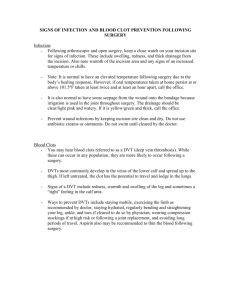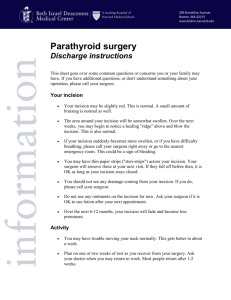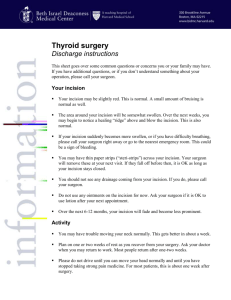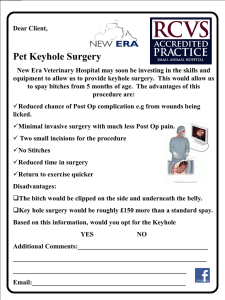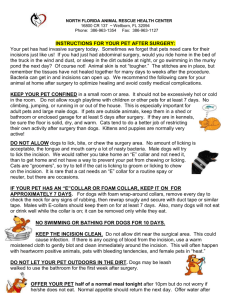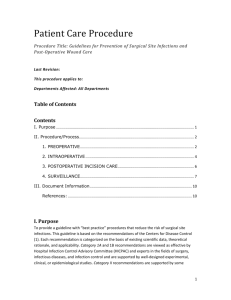Infections After Surgery Information
advertisement
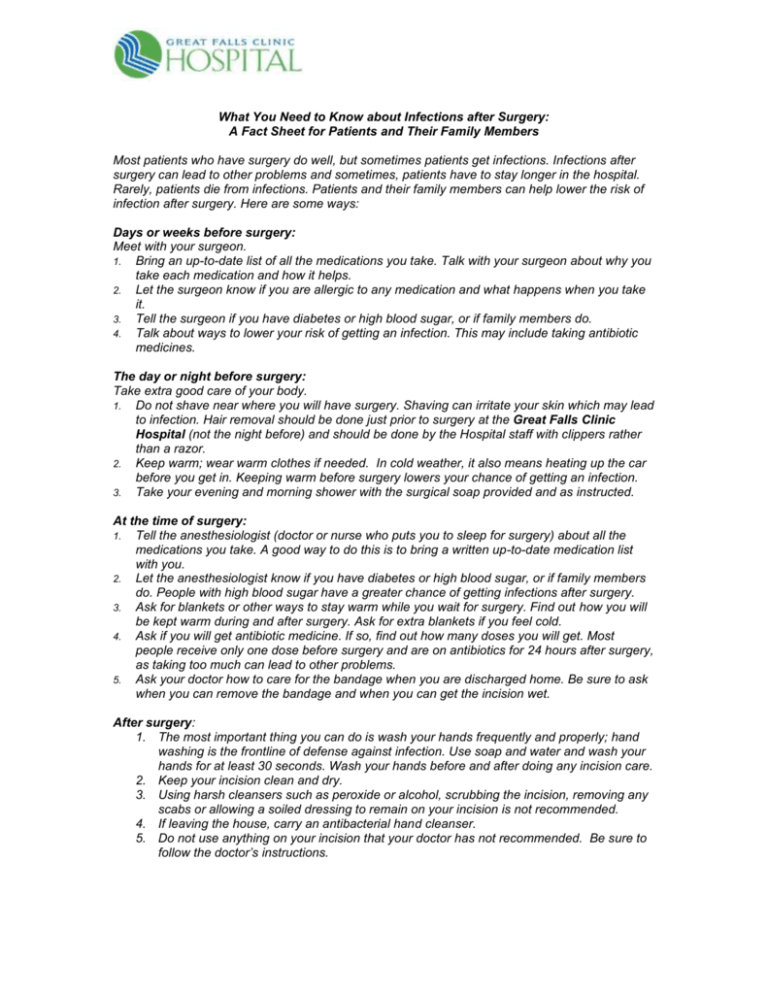
What You Need to Know about Infections after Surgery: A Fact Sheet for Patients and Their Family Members Most patients who have surgery do well, but sometimes patients get infections. Infections after surgery can lead to other problems and sometimes, patients have to stay longer in the hospital. Rarely, patients die from infections. Patients and their family members can help lower the risk of infection after surgery. Here are some ways: Days or weeks before surgery: Meet with your surgeon. 1. Bring an up-to-date list of all the medications you take. Talk with your surgeon about why you take each medication and how it helps. 2. Let the surgeon know if you are allergic to any medication and what happens when you take it. 3. Tell the surgeon if you have diabetes or high blood sugar, or if family members do. 4. Talk about ways to lower your risk of getting an infection. This may include taking antibiotic medicines. The day or night before surgery: Take extra good care of your body. 1. Do not shave near where you will have surgery. Shaving can irritate your skin which may lead to infection. Hair removal should be done just prior to surgery at the Great Falls Clinic Hospital (not the night before) and should be done by the Hospital staff with clippers rather than a razor. 2. Keep warm; wear warm clothes if needed. In cold weather, it also means heating up the car before you get in. Keeping warm before surgery lowers your chance of getting an infection. 3. Take your evening and morning shower with the surgical soap provided and as instructed. At the time of surgery: 1. Tell the anesthesiologist (doctor or nurse who puts you to sleep for surgery) about all the medications you take. A good way to do this is to bring a written up-to-date medication list with you. 2. Let the anesthesiologist know if you have diabetes or high blood sugar, or if family members do. People with high blood sugar have a greater chance of getting infections after surgery. 3. Ask for blankets or other ways to stay warm while you wait for surgery. Find out how you will be kept warm during and after surgery. Ask for extra blankets if you feel cold. 4. Ask if you will get antibiotic medicine. If so, find out how many doses you will get. Most people receive only one dose before surgery and are on antibiotics for 24 hours after surgery, as taking too much can lead to other problems. 5. Ask your doctor how to care for the bandage when you are discharged home. Be sure to ask when you can remove the bandage and when you can get the incision wet. After surgery: 1. The most important thing you can do is wash your hands frequently and properly; hand washing is the frontline of defense against infection. Use soap and water and wash your hands for at least 30 seconds. Wash your hands before and after doing any incision care. 2. Keep your incision clean and dry. 3. Using harsh cleansers such as peroxide or alcohol, scrubbing the incision, removing any scabs or allowing a soiled dressing to remain on your incision is not recommended. 4. If leaving the house, carry an antibacterial hand cleanser. 5. Do not use anything on your incision that your doctor has not recommended. Be sure to follow the doctor’s instructions. Watch for Signs of Infection: 1. Malaise: a feeling of tiredness and lacking in energy. 2. Fever: a low grade fever of 100° or less is common in the days following surgery. Chills and/or a fever of 101 should be reported immediately to your doctor. 3. Hot incision: an infected incision may feel hot to the touch. (Proper care of the incision plays an important role in preventing infection). 4. Swelling of the incision; the incision may also feel hardened and puffy. 5. Redness: some redness is normal at the incision site, but if the redness increases instead of decreases this may indicate an infection. 6. Drainage from the incision: foul-smelling drainage or pus may indicate an infected incision. The pus can range in color from blood-tinged to green. 7. Pain: your pain should slowly and steadily decrease as you heal. It is normal for increased pain if you “over do it” with activity, but an unexplained increase in pain should be discussed with your doctor. In Conclusion: Prevention is the key to management of surgical infections. While the risk of developing a post operative surgical infection is small, the consequences can be serious. If you do develop an infection or suspect you may have an infection, it is important that you identify it right away and let your doctor know. That way your doctor can provide needed treatment that is necessary to prevent any possible infection from spreading. Infections are best treated when caught early. At the Great Falls Clinic Hospital we are committed to providing you with the best of care. Because your health and safety are important to us, the Great Falls Clinic Hosptial staff is working hard to protect you from infection while you are in the hospital as well as to protect you from infection after you go home. Thank you for choosing the Great Falls Clinic Hospital for your health care needs. For more information: How to Prevent Surgical Site Infections; cdc.gov., 2009 “Surgical Infections: Prevention and Treatment”; AMJ Surg 2008; 172:68-74 If you have any questions you may call: Donna C. Lee RN Infection Prevention and Control Great Falls Clinic Hospital 3010 15th Ave. S. Great Falls, MT 59405 216-8000 You can learn more about Surgical Site Infection as it relates to the 5 Million Lives Campaign at www.ihi.org/IHI/Programs/campaign/. The 5 Million Lives Campaign is a national initiative to dramatically improve the quality of American health care. The Institute for Healthcare Improvement (IHI) and its partners seek to engage thousands of U.S. hospitals in an effort to reduce harm for five million American patients between December 2006 and December 2008. This ambitious work builds upon the great energy and commitment shown by hospitals during the 100,000 Lives Campaign, a national, IHI-led initiative focused on reducing unnecessary mortality and that ran from December 2004 to June 2006. Complete details, including materials, contact information for experts, and web discussions, are on the web at http://www.ihi.org/IHI/Programs/Campaign/. Written June 7, 2011; Revised Dec 1, 2015 Donna C. Lee/dcl
